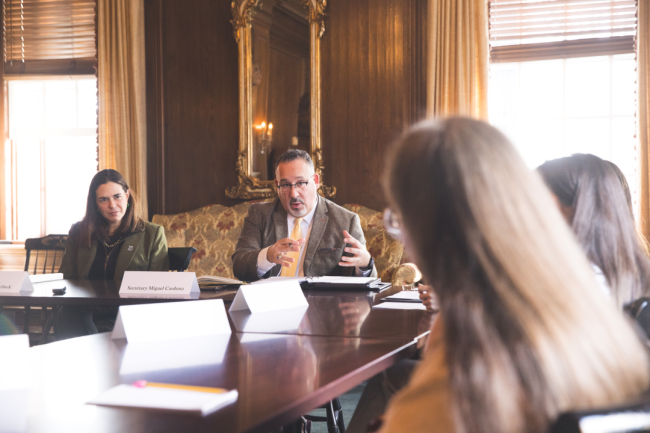You have /5 articles left.
Sign up for a free account or log in.

Secretary of Education Miguel Cardona and Dartmouth president Sian Leah Beilock talk with students on Wednesday, Jan. 10, during a roundtable on campus. The event kicked off Dartmouth Dialogues, a new initiative to encourage constructive conversations on difficult topics.
Katie Lenhart/Dartmouth
Colleges have always served as a forum for debate and discussion, but since the beginning of the Israel-Hamas war, college leaders have faced additional pressure to establish respectful and productive means of creating dialogue between campus stakeholders with differing ideals.
Dartmouth College launched Dartmouth Dialogues to build skills around empathetic listening, emotional management, conversation navigation and connection among students, faculty and staff members.
The project officially launched Jan. 10, encompassing a swath of existing and new initiatives, including the Dialogue Project, to improve community members’ practice and observation of constructive dialogues.
“I think people are so ready for this because everyone sees the issue,” says Elizabeth F. Smith, dean of the Faculty of Arts and Sciences at Dartmouth, who is spearheading The Dialogue Project. “People are tired of being afraid to speak up; they’re tired of the shouting matches and not really getting anywhere, that feeling of stuckness. I think people are ready to figure out how to move forward.”
What’s the need: Smith and her colleagues have considered an initiative around constructive dialogues for several years, with growing importance since the war in the Middle East began and with 2024 being an election year.
The Dialogue Project is not focused on debates or winning an argument but on “understanding another person’s perspective and their humanity,” Smith explains. The goal is to provide students particularly, but also everyone at the institution, with spaces to observe and practice dialogue skills, which they can then apply in the classroom, at work or in their personal lives.
The project is led by a steering committee that includes administrators, faculty, staff and student leaders, co-directed by Smith and Kristi Clemens, assistant vice president for equity and compliance and Title IX coordinator.
Smith sees it as four quadrants of work, with observation and practice on one axis and curricular activities and co-curricular activities on the other.
What’s involved: The Dialogue Project will kick off four new programs this year: a speaker series, workshops, special topics events and a partnership with the nonprofit group StoryCorps.
The speaker series will focus on building skills for constructive dialogue. The first event will take place later this month, featuring Marc Brackett from the Yale Center for Emotional Intelligence.
“One of the big stumbling blocks to engaging in a dialogue is … [that] challenging topics sometimes elicit heightened emotion and then people shut down,” Smith explains. “Marc’s done some amazing work on emotional regulation, co-regulation, et cetera,” topics he will speak about on Jan. 26.
Constructive Dialogue How-To
The Constructive Dialogue Institute offers free online resources for those in higher education looking to hold their own tough conversations in the classroom.
The project will also provide one-hour online workshops for faculty members on how to navigate difficult conversations without incivility and escalation, according to a workshop description. Following the workshops, faculty members can opt in to in-person conversations with their colleagues to discuss their experiences within the classroom and solutions.
Workshops launch this month, led by the Dartmouth Center for the Advancement of Learning.
At present, Dartmouth offers a special programming series called Middle East Dialogues, which includes courses and webinars focused on conflict in the Middle East. The events kicked off in October, with a joint forum between the Jewish Studies and Middle Eastern Studies programs, and will continue throughout the year.
Public webinars will continue in February.
Dartmouth is the first higher education partner with StoryCorps, a nonprofit focused on helping people who disagree to have meaningful conversations. Logistics are still being discussed, but Smith envisions having students, faculty and staff converse with their peers; alumni may also be invited to participate.
StoryCorps leaders will visit campus at the end of February, when there will be a larger partnership launch.
What’s next: The college is considering how to measure and assess the impact of the project, but assessment is a priority, Smith says.
“We’re doing an experiment,” she explains. “We’re not going to get it right perfectly all the time. I don’t think that after some period of time, everyone will be perfectly engaging in dialogue. It is a work in progress.”
Campus leaders are also considering adding an element of constructive dialogue to orientations or curricula, but those conversations are still in development. Over all, Smith hopes the Dialogues Project gives students skills they can take with them into the workplace and beyond.
If your student success program has a unique feature or twist, we’d like to know about it. Click here to submit.
This article has been updated to clarify the differences between Dartmouth Dialogues and the Dialogue Project.




